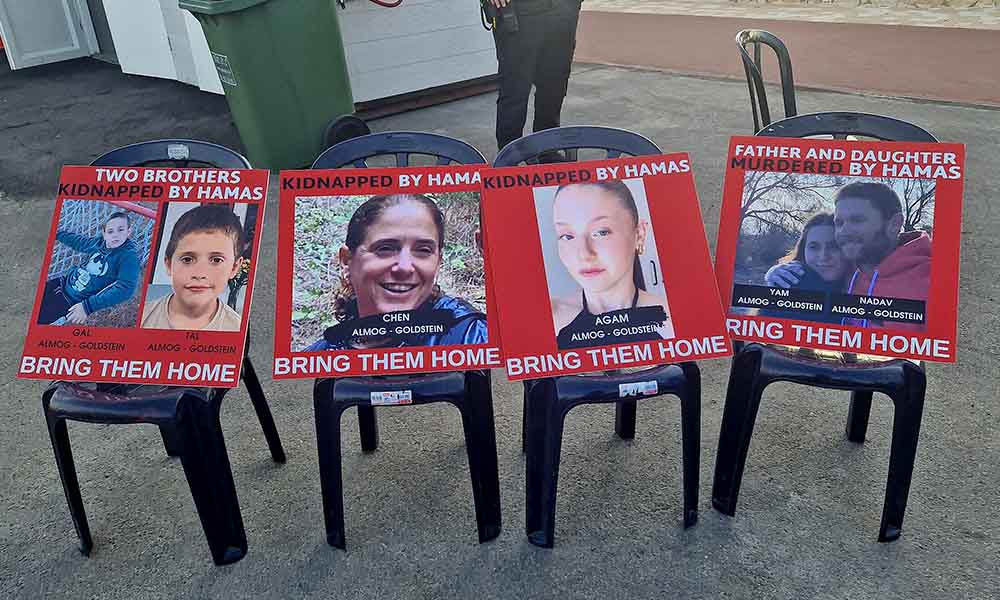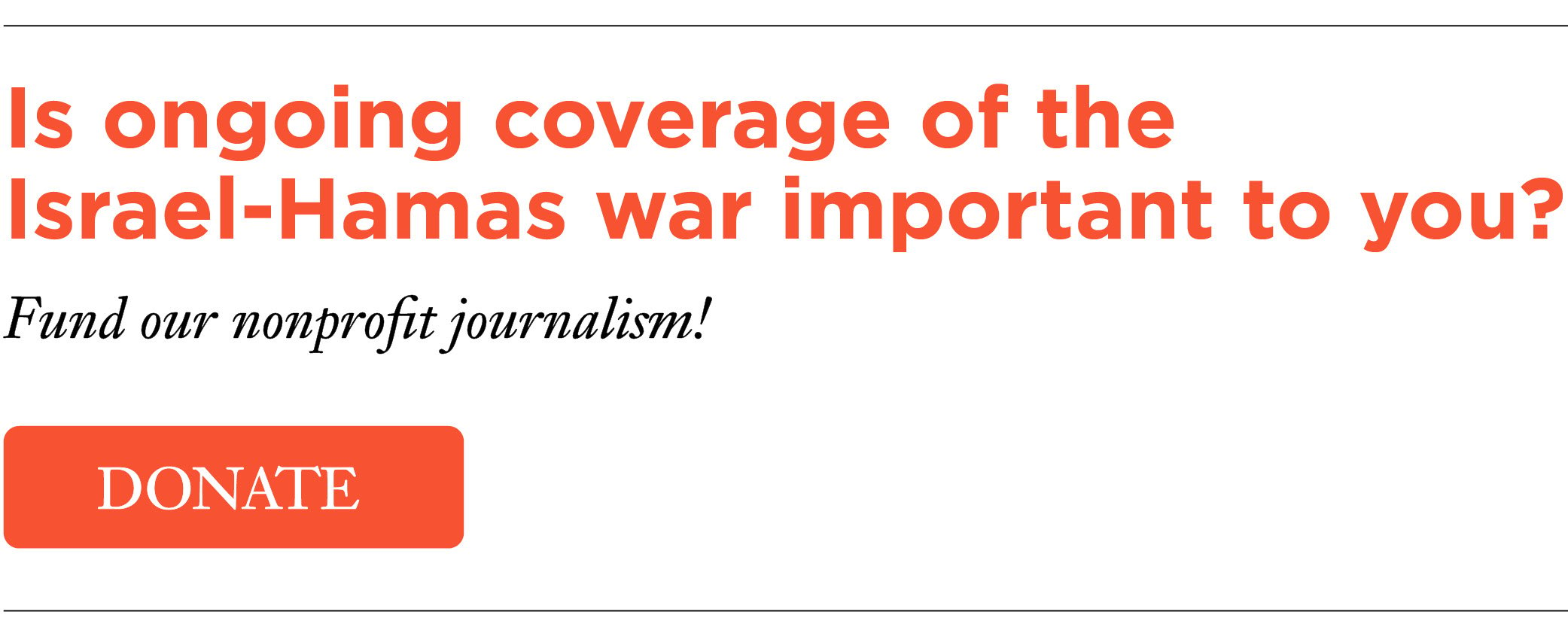
During the October 7 attacks on Israel by Hamas, Hamas abducted some 253 civilians and IDF soldiers. Over the ensuing months, 112 hostages have been freed, many during the November 21 to 27 ceasefire and through other rescue operations carried out by Israel. As of March 1, as many as 134 hostages are thought to still be in Hamas’ captivity.
Several released hostages and family members of hostages still held in Gaza have shared their stories in order to control their narratives and pressure the Israeli and American governments to act swiftly to bring the remaining hostages home. But what impact does storytelling have on the survivors themselves?
Since time immemorial, people have connected emotionally and spiritually by sharing their stories of sadness and hardship. Narrative storytelling has scientifically proven therapeutic benefits for people healing from trauma. Sharing one’s experience allows survivors of traumatic ordeals to make sense of a senseless event and offers an opportunity to discover newfound strength and resiliency within themselves. This process can also help the memory become less distressing for the survivor over time.
The stories can also galvanize others. Less than 24 hours after 253 hostages were captured by Hamas on October 7, families of the hostages formed the Hostages and Missing Families Forum, and thousands of volunteers have contributed their time and expertise to the forum’s operations in order to provide holistic medical and emotional support to families and advance the organization’s ongoing efforts to bring the hostages back home. Family members of hostages have also testified before Congress to persuade the American government to push for a ceasefire and bring the hostages home. In Israel, the families of hostages are storming Israel’s parliament and organizing mass protests to pressure Israel to negotiate the release of the hostages. Sharing their stories has allowed them to keep their family’s tragedies front and center and gain a voice on the political issues concerning the hostage negotiations.
Sharing a traumatic story can be a harrowing and daunting experience, but every individual impacted by October 7 has a unique narrative to share. While some of the hostages have chosen to stay out of the media, here are the names and accounts of some who have shared their stories and have been actively advocating to bring the hostages home.
Released Hostages and Their Stories
Chen Goldstein-Almog is participating in interviews with international media outlets to garner worldwide awareness of her experience as a hostage.
On November 26, as part of the week-long temporary cease-fire deal and hostage exchange, Chen Goldstein-Almog was released alongside her 17-year-old daughter Agam Goldstein-Almog and 11 and 9-year-old sons Gal and Tal. Over the last four months, in interviews with news outlets such as The New York Times, The Guardian and The Times of Israel, Chen has recounted her 50 days as a hostage and the fear she felt.
Chen was at the Kfar Aza Kibbutz near the Gaza border when the attacks by Hamas started. In an interview with The Guardian, she described what unfolded before she and three of her children were kidnapped by Hamas. She said she and her family barricaded themselves in their eldest daughter, Yam’s, room for five hours before Hamas barged through the doors and shot her husband, Nadav, in the chest. Yam died shortly after from a bullet wound to the face when a Hamas militant shot her after she fainted.
“With time this image becomes more and more blurred, but every night, throughout this whole time, just before nighttime, I try to force myself to remember that image, that scene,” Chen told The Guardian about the events that unfolded on October 7. “It was such a difficult thing that I was witnessing, that it’s a process of self-torture in a way for me not to ever forget that.”
In an interview with The New York Times, Chen shared her peculiar and unexpected interactions with Hamas. She said she would have deep conversations with the guards that would carry on for hours, and the guards even taught her son words in Arabic. Though she and her children were allowed to stay together and were not physically harmed, she said her constant fear was “at a level we didn’t know existed.” When a Hamas guard apologized for her husband’s murder, she said she didn’t respond because she “didn’t feel like I could express any negative feelings.” She also said she had met other hostages while moving between secret locations who had been abused.
Agam Goldstein-Almog has appeared in a documentary to bring attention to the sex crimes committed by Hamas.
Like her mother, Agam Goldstein-Almog has appeared in the media often since November 26, but she has chosen to use her platform to be very vocal about the stories of physical and sexual abuse other hostages shared with her during captivity. In a documentary about the sexual violence committed by Hamas on and after October 7, Screams Before Silence, Agam said many of the female hostages whom she met in Gaza were sexually abused and also being held alone. Agam said one hostage confided in her about how she was raped by a member of Hamas at gunpoint.
In a different interview with Israel’s Army Radio, Agam said she was wracked with fear when they were kidnapped, and as they crossed the border into Gaza, Agam told her mother “they are going to torture me, they are going to rape me.” She said being held hostage took away her sense of security and instilled feelings of anxiety and helplessness in her.
Yarden Roman-Gat is campaigning for her sister-in-law’s safe return from captivity.
Yarden, her husband, Alon Gat, and their three-year-old daughter, Geffen, had just returned to Israel from a vacation abroad and were visiting family in Kibbutz Be’eri on October 7 when they were forced by Hamas militants into a car heading for Gaza. Yarden and Alon saw their opportunity to escape the moving vehicle and seized it, and while running, Yarden handed Geffen off to Alon and then ran in a separate direction to divert the Hamas members off her husband’s tracks. Her husband managed to escape by hiding in a ditch with Geffen for several hours until things quieted down, but Yarden was caught and taken captive for 54 days.
In an interview with CBS News, she recounted how she was paraded through the streets of Gaza and how she was given a hijab, which she considered her only piece of protection while she was surrounded by male guards 24/7. She recalled that while the week-long ceasefire was in effect, one of the guards would enter their room in the middle of the night, every night, and tell her whether she was on the list of hostages who were to be released the following day.
Yarden’s sister-in-law, Carmel, is still in captivity, and when Yarden was asked why she agreed to do the interview with CBS News, she said, “My sister-in-law Carmel and a bunch of other hostages are still in Gaza. And it’s wrong. And we have to stop it. And if we can do anything to help that, we will.”


Families of the Hostages
Yehuda Beinin is writing opinion pieces to express his criticism of Netanyahu’s response to October 7.
Yehuda Beinin is the father of Liat Beinin, an American citizen who was taken by Hamas during their attack on Kibbutz Nir Oz. Though Liat was released during the November Israel-Hamas cease-fire, her husband, Aviv, was killed on October 7.
Beinin is a politically outspoken member of the Hostages and Missing Families Forum who has vocalized his criticism of Netanyahu’s response to October 7 and has called for a negotiated cease-fire that guarantees the release of all the hostages. In a December 2023 op-ed for CNN, Beinin urged the American government to do everything in their power to organize the immediate return of the remaining hostages and called Netanyahu unfit at managing the hostage situation. In regards to Netanyahu placing more importance on destroying Hamas than bringing the hostages home, Beinin wrote, “I am no politician—which of these goals is more important to Israel’s future, I cannot tell you. But I am the father of a woman who was held hostage in Gaza for 54 days and the father-in-law of a man killed by Hamas. I know which goal is more urgent for families like mine.”
Thomas Hand is using his story to bring hope to other families whose loved ones are still in Gaza.
Thomas Hand is another father of a hostage who has continued advocating for the hostages’ safe return after his daughter returned following the first wave of released hostages during the November ceasefire. Thomas is the father of nine-year-old Emily Hand, who was taken by Hamas from Kibbutz Be’eri on October 7. Emily was eight when she was kidnapped and turned nine in captivity.
Thomas was part of a group of Knesset members and hostage families who met with lawmakers in Washington, DC, back in February to advocate for a hostage deal. In an interview with The Jerusalem Post, he said he was there to offer his support and give the other families hope that their loved ones will return soon. Unlike Yehuda, however, Thomas believed the IDF must complete its mission to destroy Hamas or everything that has happened would have been “pointless.” He said, “we have to finish the job; I don’t care what the world says.”
Hostages and the power of storytelling
Of the 253 civilians and soldiers captured by Hamas on October 7, only a small handful of stories are represented here. The continuing legacy of Holocaust literature teaches us that powerful stories of survival and resilience will continue to surface for decades to come—and also, that many stories will never be told, the people who experienced them lost forever. The stories we tell about October 7 and the subsequent months, and how we tell them, will impact Jews and Jewish life, and the lives of those we touch, for generations.
Analysis | After October 7, Holocaust Literature Will Never be the Same
From 1975 | “Remembering,” by Elie Wiesel
Remembering: Holocaust Literature From Survivors’ Accounts to 3G
Top image: Posters of the Goldstein family. Gal, Tal, Chen and Agam were released by Hamas after this photo was taken. Nadav and Yam (right poster) were murdered by Hamas. Photo credit: Hanay (CC BY-SA 4.0).
